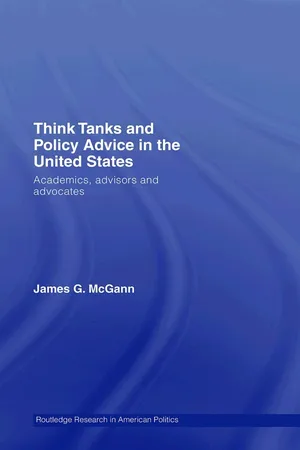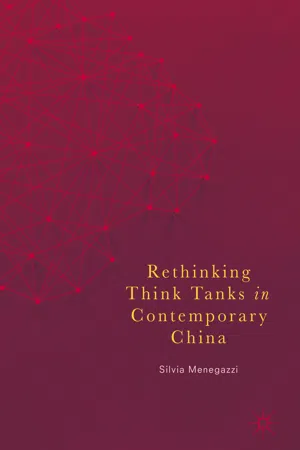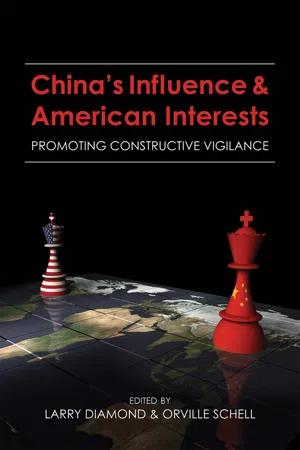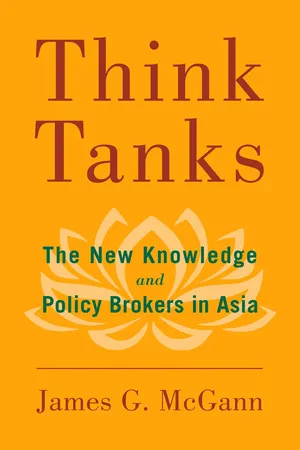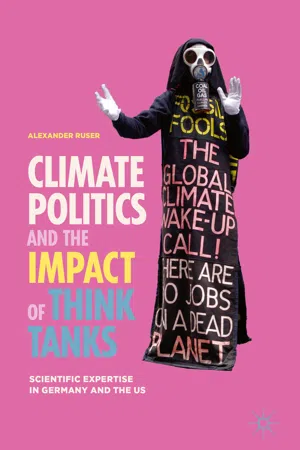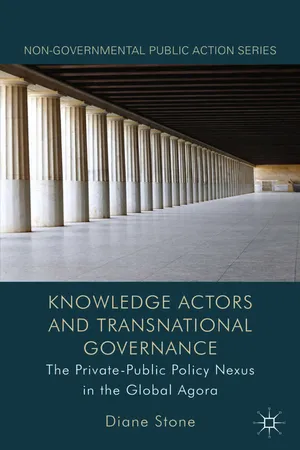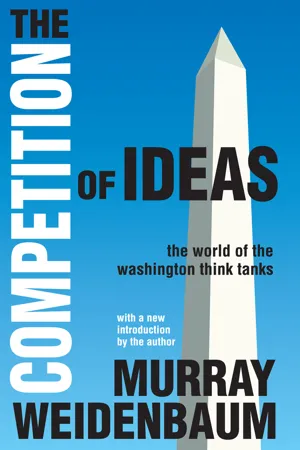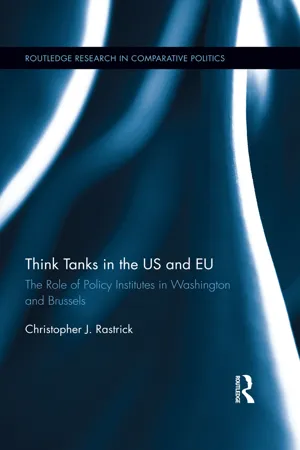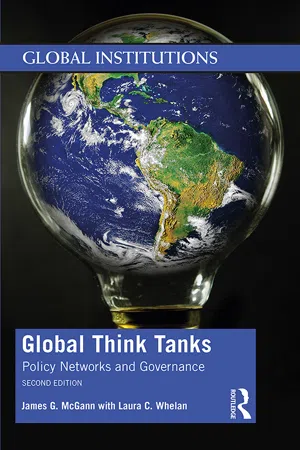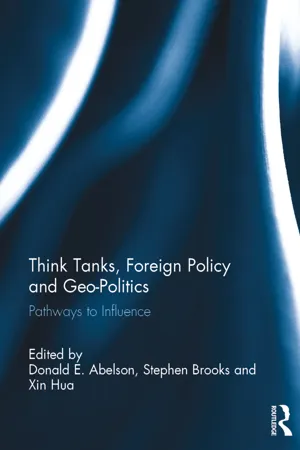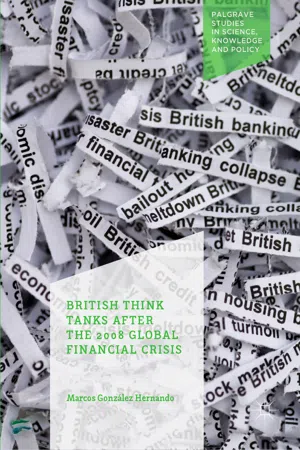Politics & International Relations
Think Tanks
Think tanks are organizations that conduct research and provide analysis and recommendations on various policy issues. They often influence public policy and decision-making by producing reports, hosting events, and engaging with policymakers. Think tanks can be ideologically driven or nonpartisan and play a significant role in shaping political and international relations discourse.
Written by Perlego with AI-assistance
Related key terms
Related key terms
1 of 4
Related key terms
1 of 3
11 Key excerpts on "Think Tanks"
- eBook - ePub
- James G. McGann(Author)
- 2007(Publication Date)
- Routledge(Publisher)
3 Think Tanks defined
Think Tanks or public policy research, analysis, and engagement institutions are organizations that generate policy-oriented research, analysis, and advice on domestic and international issues in an effort to enable policymakers and the public to make informed decisions about public policy issues. Think Tanks may be affiliated with political parties, governments, interest groups, or private corporations or constituted as independent nongovernmental organizations (NGOs). These institutions often act as a bridge between the academic and policymaking communities, serving the public interest as an independent voice that translates applied and basic research into a language and form that is understandable, reliable, and accessible for policymakers and the public.Structured as permanent bodies, in contrast with ad hoc commissions or research panels, Think Tanks devote a substantial portion of their financial and human resources to commissioning and publishing research and policy analysis in the social sciences: political science, economics, public administration, and international affairs. The major outputs of these organizations are books, monographs, reports, policy briefs, conferences, seminars, briefings and informal discussions with policymakers, government officials, and key stakeholders.Classification
Attempts to define and/or categorize Think Tanks, raises a debate over the meaning of such basic terms as “public policy research,” “think tank,” and “advocacy.” The subtitle of this book is intended to capture the struggle that exists among Think Tanks concerning their role in the policy-making process: Are they academics, advisors, or advocates? Can a think tank be effective if it is not an advisor or advocate? This debate reflects the inherent tension between the world of ideas and world of politics or the clash of the academic and policy cultures. The categories provided below are designed to help bring these differences into focus so that a more informed debate can occur. - eBook - ePub
- Silvia Menegazzi(Author)
- 2017(Publication Date)
- Palgrave Macmillan(Publisher)
Andrew Rich believes Think Tanks are “independent, non-interest based, non-profit organizations that produce and principally rely on expertise and ideas to obtain support and to influence the policy-making process” (2005, 11). But, according to Rich, a clear and definitive definition of the term is neither possible nor desirable. To understand how we can differentiate Think Tanks from any other organizations and institutions requires, in fact, a focus on their products and objectives (Rich 2004). Abelson defines Think Tanks as “non-profit-making, tax-exempt, non-partisan (not to be confused with non-ideological) institution[s] engaged in research and analysis on one or more issues related to public policies, whether foreign or domestic.” He recognizes, however, that, “as Think Tanks have grown in number and become more diverse, scholars have been unable to reach a consensus on how to describe them” (Abelson 2014, 127). Both category-driven and definition-driven think tank studies highlight the importance attributable to Think Tanks’ organizational structure within the literature. In a similar vein, sociological inquiries are useful, providing insights to the study of Think Tanks in the policymaking process. Thomas Medvetz, through a different perspective, points out that it is precisely the problem of what he calls the “semantic ambiguity” of the term that contributes to the inconsistencies of the historical narratives about Think Tanks (Medvetz 2012) - eBook - ePub
China's Influence and American Interests
Promoting Constructive Vigilance
- Larry Diamond, Orville Schell, Larry Diamond, Orville Schell(Authors)
- 2019(Publication Date)
- Hoover Institution Press(Publisher)
CHAPTER FIVE Think TanksThink Tanks play an unparalleled role in shaping American public opinion, media narratives, and US government policy. For this reason, they are high-value targets for lobbying and influence activities by foreign governments and nongovernmental actors, including those from the People’s Republic of China.Think Tanks in the United States date to the early twentieth century, when industrial capital and private philanthropy (led by the likes of Andrew Carnegie, John D. Rockefeller, Andrew W. Mellon, and Henry Ford) began to endow private nonprofit research institutions at a time when there was increasing government demand for expertise on a growing range of public-policy issues. Over the past century, Think Tanks have come to play ever more vital roles in the American public-policy process, and they contribute both directly and indirectly to public education, a richer public dialogue via the media, greater civic engagement, and better-informed government policy formulation.Of the approximately 1,800 Think Tanks in the United States today, about half are research institutions located within US universities. For the purpose of this chapter, however, only those Think Tanks located in non-university private-sector settings are considered. Most of these Think Tanks and research institutions enjoy tax-exempt status under section 501(c)(3) of the Internal Revenue Code, which stipulates that they are restricted from legislative lobbying as “action organizations.” Institutions that receive this tax-exempt status must either be charitable philanthropic organizations or research organizations (Think Tanks) that operate in a supposedly nonpartisan way and in the general public interest. Because they are largely privately funded through donor contributions, US Think Tanks compete tenaciously for support, professional expertise, and public impact. - eBook - ePub
Think Tanks
The New Knowledge and Policy Brokers in Asia
- McGann(Author)
- 2019(Publication Date)
- Brookings Institution Press(Publisher)
Structured as permanent bodies, in contrast with ad hoc commissions or research panels, Think Tanks devote a substantial portion of their financial and human resources to commissioning and publishing research and policy analysis in the social sciences: political science, economics, public administration, and international affairs. The major outputs of these organizations are books, monographs, reports, policy briefs, conferences, seminars, briefings, and informal discussions with policymakers, government officials, and key stakeholders. While purely academic research is focused on creating new knowledge, Think Tanks are focused on producing research, analysis, and advice in a form that is accessible and understandable for policymakers and the public. Some of the functions Think Tanks engage in include:- Carrying out research and analysis on policy problems.
- Providing advice on immediate policy concerns.
- Evaluating government programs.
- Interpreting policies for electronic and print media, facilitating public understanding of and support for policy initiatives.
- Facilitating the construction of issue networks that involve a diverse set of policy actors who come together on an ad hoc basis around a particular policy issue or problem.
- They are more effectively future-oriented than government research functionaries, who work in an environment in which efforts at creative disposition are rarely rewarded.
- They are more likely to generate reconfigured policy agendas, while bureaucracies thrive on a security-maximizing environment of standard operating procedures.
- They are better able to facilitate collaboration among separate groups of researchers for a common purpose because they have no permanent vested interest in a specific domain.
- They aid intellectual synthesis that results from breaking down bureaucratic barriers because they are better able to: disseminate information to targets; deal with the interdisciplinary nature of global policy issues; function as conveners; telescope the policy process from data collection to knowledge/policy creation; conceive the means of implementation than government bureaucracies, which may be internally segmented by department and area of specialization.92
In light of this discussion, many of the Think Tanks in the United States and a growing number of other countries strive to be nonpartisan policy research, engagement, and formulation organizations that generate policy-oriented research, analysis, and advice on domestic and international issues, that enable policymakers and the public to make informed decisions about public policy by offering such advice in the form of intellectual argument, platforms for convocation and debate, and resources, and which have significant autonomy from government and societal interests, such as business firms, interest groups, and political parties.93 - eBook - ePub
Climate Politics and the Impact of Think Tanks
Scientific Expertise in Germany and the US
- Alexander Ruser(Author)
- 2018(Publication Date)
- Palgrave Macmillan(Publisher)
sources of income, spending, or recruiting practices). Moreover, the term “think tank” itself somehow falsely implies a uniformity of structure and properties that belies the true diversity of organizations that are labelled by it. In the relevant literature, the term is applied to a diverse set of research institutions, public policy institutes, and consultancies. It has been described as more or less an ‘umbrella term that means many different things to many different people’ (Stone 1996 : 9). For Thomas Medvetz, ‘the basic problem is that the central concept itself is fuzzy, mutable and contentious’ (2012 : 23) and thus the definition of what a think tank is can change over time (Medvetz 2012 : 26–28). Despite a general ‘lack of consensus (…) in defining Think Tanks’ (McGann and Johnson 2005 : 11), however, I use a working definition depicting them as ‘independent, non-profit research facilities, engaged in applied research provided to political decision makers’ (Ruser 2013 : 331). Perhaps the most elaborate definition was developed by Donald Abelson. He begins with a list of basic organizational characteristics that most Think Tanks have in common: ‘they are generally nonprofit, nonpartisan organizations engaged in the study of public policy’ (Abelson 2009 : 9). Additionally, he considers the relatively broad spectrum of think tank behaviour: Think Tanks can embrace whatever ideological orientation they desire and provide their expertise to any political candidate or office-holder willing to take advantage of their advice. […] Not all Think Tanks share the same commitment to scholarly research or devote comparable resources to performing this function, yet it remains, for many, their raison d’être - eBook - ePub
Knowledge Actors and Transnational Governance
The Private-Public Policy Nexus in the Global Agora
- D. Stone(Author)
- 2013(Publication Date)
- Palgrave Macmillan(Publisher)
However, the matter of ‘independence’ is a vexed one. The Western view that a think tank requires independence or autonomy from the state, corporate or other interests in order to be free-thinking does not accord with experiences in other cultures. In many countries, the line between policy intellectuals and the state is blurred to such an extent that to talk of independence as a defining characteristic of Think Tanks makes little sense. Some Think Tanks ‘have become a permanent part of the political landscape in many different countries’, notwithstanding their legal constitution as NGOs, ‘so much so that they are now an integral part of the policy process’ (Barani and Sciortino, 2011: 3).Many organisations now called ‘Think Tanks’ operate within government. A well-known example is Clingendael (the Netherlands Institute of International Relations) sponsored by the Dutch Government since 1980s. Some institutes have been incubated in government and subsequently made independent. In other circumstances research institutes are attached to corporations as is evident in Japan, South Korea and Taiwan. Some political parties have created in-house Think Tanks in the form of party institutes or foundations. This is particularly noticeable in Germany with bodies like the Konrad Adenauer Stiftung (linked to the Christlich Demokratische Union) but which also funds policy research by other bodies. Other German foundations have been established by political parties or have ties to the Länder (Braml, 2004).Given that the primary – but not exclusive – targets of Think Tanks are legislatures and executives, bureaucrats and politicians, independence is variable. Think Tanks are often in resource-dependent relationships with these organisations and actors. Notwithstanding funding dependence or political affiliation, high-quality research and analysis along with critical advice is feasible. It is the balance of attributes that is the important consideration: - eBook - ePub
The Competition of Ideas
The World of the Washington Think Tanks
- Murray Weidenbaum(Author)
- 2017(Publication Date)
- Routledge(Publisher)
Because of the substantial variation of activity between and within each think tank, it is a real challenge to try to generalize about their activities. A useful starting point is to cite the position of thoughtful critics. Viewing Think Tanks from the radical left, Dan and Mary Ann Clawson have offered the following constructive summary:Think Tanks are crucial to the policy formation process, providing information, ideas, and proposals to be considered by the government, the mass media, and capitalists themselves.15A more academic description of the think tank world is provided by Yale political scientist David Ricci, who divides their work into two groups: long-term mobilization and short-term mobilization. As he sees it, long-term efforts include writing journal articles, monographs, and books so as to disseminate scholarly analyses to thoughtful readers on a variety of issues.16 In that regard, Think Tanks serve as important conduits for the more fundamental research that is performed at universities.Short-term mobilization of public opinion, in contrast, relies more on such “middle men” activities as participating in television talk shows and news programs, writing op-eds or regular columns for newspapers and magazines, and sponsoring a wide variety of meetings, symposia, and conferences. The latter activity provides an opportunity for guests to hear the in-house scholars—and other invited speakers—discuss the latest information and opinion. Other short-term activities include testifying before congressional committees, serving on advisory commissions, and providing informal sources of information for congressional staff members. The simultaneous expansion of Washington offices of businesses and other interest groups has added to the demand for think tank outputs.In recent years, it seems clear that the short-term activity of Think Tanks has been given increased emphasis. The rise of the Heritage Foundation, with its success in generating policy materials used by members of the Congress in their current deliberations, is an important contributor to that trend. A second and closely related development reinforces that tendency to emphasize the short term: the rapid increase in the size and importance of congressional committee staffs has generated another important category of users of the output of Think Tanks.17 - eBook - ePub
Think Tanks in the US and EU
The Role of Policy Institutes in Washington and Brussels
- Christopher Rastrick(Author)
- 2017(Publication Date)
- Routledge(Publisher)
apropos manner. Though many American think tank scholars do, to some extent, publish their research in scholarly journals and produce scholarly monographs (oftentimes through a think tank’s in-house press), the desire to provide topical and policy-relevant research tends to force Think Tanks to focus on more expedient routes of publication. As such, scholars from American Think Tanks are frequently well represented in opinion magazines, policy journals, newspapers (both interviews and op-eds), as well as publications emanating from Think Tanks themselves. Especially in the twenty-first century, American Think Tanks have increasingly come to rely on their Internet webpages as one of the primary modes of publication and dissemination among their target constituencies – it is clearly more convenient and expedient to refer to the web-site of a given think tank than seek out a column in a physical policy journal or newspaper. Thus, through academic and non-academic publications, in print and online, American Think Tanks seek to disseminate their research and analysis to a wide constituency. So how does the production and publication of research afford American Think Tanks the opportunity to exercise informal influence?First, by focusing on the expedient release of research on policy-relevant topics and themes, American Think Tanks are able to project their ‘narrative’ and parameters of debate on topical policy issues and dilemmas. The relevance of think tank research can be useful at various stages of the policymaking process. From conceptualization to implementation, information and analysis by Think Tanks are valuable sources that policymakers can consider in making their decisions. Weidenbaum corroborates this, suggesting that “at times Think Tanks set the agenda for those important debates by focusing attention on emerging national concerns or presenting new approaches to solving problems already widely recognized” (Weidenbaum 2009, 2). Unlike the publication of monographs and scholarly journal articles, which might face editorial and publication delays from months to years, publishing in opinion magazines, non-academic journals, newsletters, and blogs (among other mediums) allows Think Tanks to provide relevant research and analysis on pressing policy issues. Policymakers, in particular, are keen to receive a wide array of interpretations and viewpoints on a given policy topic, especially areas that are underserved by internal research and the research limitations of their offices or departments. Recognizing these shortcomings in awareness, knowledge, and research capacity, Think Tanks are able to ‘fill the void’ and allow policymakers to make informed, empirically substantiated policy decisions in a reasonable timeframe (Wiarda 2008, 97). Thus, one of the main benefits for Think Tanks producing policy-relevant publications is the ability to respond to the low supply and concomitant high demand by policymakers for timely, policy-focused research. In an ideal situation (for both policymakers and their constituents), policymakers would have an uninterrupted period of time to focus exclusively on a given policy area, with access to a complete library of research on the history and implications of each of these policy areas. Of course, in the reality of contemporary American policymaking, this is simply not the case. Instead, policymakers are constantly juggling multiple tasks and priorities in Washington and within their constituencies, rendering the aforementioned ideal ‘intellectual digestion’ period an impossibility. This, of course, is where American Think Tanks are once again able to step in and assert their utility to policymakers. By rejecting the notion of providing a definitive, robust interpretation of a given policy area, Think Tanks focus on providing policymakers with condensed, brief research and analysis that provides the most relevant and critical information, with an economy of writing. Accordingly, notwithstanding the critical importance of ‘policy briefs’ in providing policy-relevant research, they are “more important for policymakers and their busy staff, [as] they can be read and summarized in a matter of minutes, not hours or days” (Abelson 2006, 151). Compared with the time that would be demanded by monographs and lengthy scholarly publications, Think Tanks focus on providing policymakers with timely, digestible research in time-sensitive policy areas. - eBook - ePub
Global Think Tanks
Policy Networks and Governance
- James G. McGann, Laura C. Whelan(Authors)
- 2020(Publication Date)
- Routledge(Publisher)
culs-de-sac , and from bias and fads that have affected everyone else in their day, but Think Tanks have done well enough to become part and parcel of the way that government works in the United States. The reasons, however, are not all obvious, and the implications are not fully understood even by the participants in the world of Think Tanks. It turns out that the sociological impacts of Think Tanks are as crucial as any other, and the deeper sociocultural origins of Think Tanks are more important than the obvious institutional ones.Think Tanks in the US context
The origin of Think Tanks in America is far more complicated than the introductory sketch given earlier suggests, and these complications deserve careful attention. In general, Think Tanks are very educational. While the vast majority of Think Tanks in the United States are focused on foreign relations and economic affairs, there is a think tank for every issue area. As more than mere advocacy groups, these Think Tanks unite scholars and policymakers to discuss and debate pressing issues in order to create relevant and applicable policies for the government to adapt.Think Tanks are an American invention, and their development remains largely an American phenomenon. There are about 8,200 Think Tanks in the world, including 1,872 located in the United States and 2,219 located in Europe. Think Tanks have had, and still have, a greater influence within the US policy process than Think Tanks do in any other country.Second, public policymaking in the United States is very porous to non-governmental influence compared to virtually all other countries. The reason is structural and quite obvious when noted. The US system of government features a much sharper division between the executive and legislative branches than in standard parliamentary systems, including that of Central America and the Caribbean. A prime minister acts both as the executive and the head of his party in the legislature; a president does not. In most parliamentary systems, initiative for legislation comes from an indistinct collusion between the head of the government, his party, and its parliamentary contingent. In the United States, on the other hand, initiative for legislation can and does come from both Congress and the White House. - eBook - ePub
Think Tanks, Foreign Policy and Geo-Politics
Pathways to Influence
- Donald E. Abelson, Stephen Brooks, Xin Hua, Donald Abelson, Stephen Brooks, Xin Hua(Authors)
- 2016(Publication Date)
- Routledge(Publisher)
7 Think Tanks and foreign policy in the United KingdomMark Garnett and Simon MabonIntroduction: Influence and causationEarly in 2015, John de Boer, a senior policy advisor with the UNU Centre for Policy Research, published an article entitled “What Are Think Tanks Good For?”. For de Boer, the raison d’etre of a think tank is “to serve as important catalysts for ideas and action” (de Boer 2015).Academic analysts of the increasingly dynamic and crowded world of policy advice have always faced the seemingly intractable challenge of identifying – and evaluating – “influence”. In an ideal scenario for the researcher, the role of policy-oriented institutions like Think Tanks would be direct and significant; for example, a decision-maker about to embark on a specific course of action would read a think tank publication, change his or her mind, and give the kind of public acknowledgement which is normally confined to Academy Award winners. However, even evidence like this could not be taken at face value; as David Hume warned us, causation is never as simple as it seems on the surface.De Boer’s reference to “catalysts” is useful to all students of Think Tanks, and is particularly relevant in the context of the present chapter. However, it does not remove the methodological difficulty since in science every catalyst is crucial; applied to policy influence, the word still implies a level of input without which decisions would have been different. Richard Higgott and Diane Stone (1994) have argued that evidence of think tank influence should not be confined to instances where decision-makers seem to have changed their minds; such institutes can also perform a “legitimising” role, lending credibility to the decisions and utterances of political actors. However, if taken too far, this approach could lead us to lower the bar for think tank influence to a point where all - Marcos González Hernando(Author)
- 2019(Publication Date)
- Palgrave Macmillan(Publisher)
Fourthly, as Think Tanks are ‘actual’ organisations, the crisis can also affect their institutional environment, for instance by opening or closing funding avenues. As a consequence, the worth of available resources and the boundaries between fields of contention can become acutely uncertain, and Think Tanks are likely to eagerly engage in communicative discourse. In such a juncture, the role of intellectuals and experts becomes both more important and more suspect. Gramsci once said that in crises “the old is dying and the new struggles to be born” (1999 [ 1971 ]: 556). Nonetheless, even when supplied with a cogent and timely narrative, Think Tanks can find it difficult to assert their views and attain a recognisable position in the public imagination. The most obvious obstacles to this are the availability of financial means, staff, and time, but access to networks and symbolic power are at least as important. In the next section, I expand on how Think Tanks’ public interventions can reveal changes in both ideas and institutional logics, which frame the methodology of this book going forward. Public Interventions as the Intersection of Ideas and Organisations The concept of ‘intellectual’ or ‘public’ intervention has its roots in the idea of ‘performative utterance’—from speech act theory, opposed to a representationalist view of language (Austin 1961)—meaning any speech act not merely ‘representing’ the world but acting upon it (Baert 2012 : 310). Public interventions, thus understood, have an illocutionary character: not only do they provide a picture of the world, but can have consequences over what they describe and over those who utter them. For Think Tanks, these ‘utterances’ most often take the form of oral or written texts—though one should also include indicators, statistics, and other non-verbal forms of communication (Eyal and Levy 2013)
Index pages curate the most relevant extracts from our library of academic textbooks. They’ve been created using an in-house natural language model (NLM), each adding context and meaning to key research topics.
Explore more topic indexes
Explore more topic indexes
1 of 6
Explore more topic indexes
1 of 4
